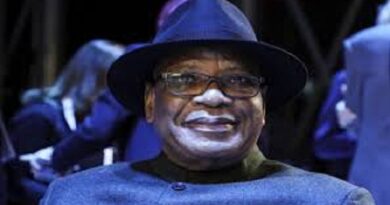Malami’s Many Controversies Revealed
Malami’s Many Controversies Revealed
The office of the Attorney-General of the Federation (AGF) and Minister of Justice is a creation of the 1999 Constitution under sections 150(1) & (2).
The current occupant of the office is the Senior Advocate of Nigeria (SAN) Abubakar Malami.
Newera News learnt that Malami was appointed by President Muhammadu Buhari in 2015 and is regarded as one of the key members of his cabinet.
Observers have argued that going by the controversies, Malami may become the most controversial AGF in the nation’s history.
Nevertheless, the Minister has remained resolute that he has always acted, as was expected of him, in the public interest.
The latest of such controversy was his intervention in the Magodo Estate, Lagos crisis over land ownership.
Speaking for his colleagues in the region the Southwest Governors’ Forum (SGF), Ondo State Governor Olurotimi Akeredolu, flayed the role of the AGF and the IG in the deployment of a police detachment.
“We condemn, in very clear terms, the role of the Attorney General of the Federation, Mr Abubakar Malami SAN in this act of gross moral turpitude,” Akeredolu said, adding that “We condemn, very strongly, this brazen assault on decency.”
The Southwest governors chairman called on the IG to “explain the justification for this intrusion.”
Akeredolu said any expectations of rapprochement between so-called federating units and federal security agencies “are becoming forlorn, progressively, due to deliberate acts which mock our very avowal to ethics and professionalism.”
The governor, an advocate of a state police system in Nigeria, questioned the current federal policing structure which compels a governor to “seek clarifications on security issues in his jurisdiction from totally extraneous bodies or persons”, describing it as “a sure recipe for anarchy.”
Despite the criticism, Malami continued to justify his action, insisting that it was incumbent on him as the nation’s Chief Law Officer, to ensure compliance with the law and court decisions.
Malami’s Many Controversies Revealed
“It is important to state that the office of the Attorney-General of the Federation belongs to the Executive arm of the government. The Supreme Court belongs to the Judiciary.
“The Office of the Attorney-General of the Federation and Minister of Justice takes exception to the Southwest governors unjustifiable insinuation of impunity against the office of the Attorney- General over execution of a judgment of the Supreme Court.
“The role of the executive is, in this respect, simply to aid the maintenance of law and order in due compliance with rule of law arising from giving effect to the judgment of the apex court of the land.
“Let it be known that the issue is regarding a Supreme Court Judgment that was delivered in 2012 long before the coming of President Muhammadu Buhari’s administration in office at a time when Malami was not a minister.
“The judgment was a re-affirmation of the judgments of Court of Appeal and High Court delivered on 31st December 1993.
“The Press Release came to us as a surprise. We see it as vituperation of ulterior motives of some political class who derived pleasure in dragging the name of Malami in the mud to achieve some sinister objectives…
“It is a common knowledge that execution of the judgment and orders of courts of competent jurisdiction, and the court of last resort in the circumstances remains a cardinal component of the rule of law and the office of the Attorney-General wonders how maintenance of the law and orders in the course of execution of the judgment of the Supreme Court can be adjudged by the imagination of the governors to be unruly.
“We want to restate that the sanctity of the rule of law is not a matter of choice,” Malami said in a statement issued on January 5, 2022, by his media aide, Umar Gwandu.
The Magodo incidents came just while many were trying to put behind them the October 29, 2021 invasion of the Abuja residence of Justice Mary Odili of the Supreme Court by some security operatives.
Malami’s name also featured prominently in the case, with one of the suspects claiming to have a relationship with the AGF, had earlier acted as a consultant to him.
Malami’s Many Controversies Revealed
Although Malami denied his involvement and distanced himself from the suspect, it seemed the more the AGF tried, the more the suspicion about his involvement grew.
For the first time in the nation’s history, few days after his denial, a group of senior lawyers, acting under the aegis of the Body of Senior Advocates of Nigeria (BOSAN) led by Adegboyega Awomolo (SAN), protested to the office of the AGF and demanded that those behind the invasion on Justice Odili’s residence be unveiled.
Also, the Nigerian Bar Association (NBA) stated that it had no confidence in Malami’s involvement in investigating the incident.
The NBA, through the Chairman of Section, Public Interest And Development Law (SPIDEL), Monday Ubani, argued that Malami was not fit to set up an independent panel to probe the siege on Justice Odili’s residence because his name featured in the incident.
“It is wrong for probably the AGF to investigate himself, because of the fact that he had been implicated, sort of, not that he has been found liable, but somebody mentioned his name,” Ubani said.
The above cases are only the recent few instances involving Malami.
Malami’s Many Controversies Revealed
2015 Kogi governorship election
Shortly after his appointment in 2015, Malami raised dust when he directed the Independent National Electoral Commission (INEC) to allow the All Progressives Congress (APC) to substitute its dead candidate in the Kogi State governorship election.
While many had thought James Faleke, the running mate to the deceased governorship candidate, Abubakar Audu, ought to automatically step in, Malami argued otherwise.
Malami contended that “the issue is very straightforward. Fundamentally, Section 33 of the Electoral Act is very clear that in case of death, the right for substitution by a political party is sustained by the provisions of Section 33 of the Electoral Act.
“And if you have a community reading of that section with Section 221 of the constitution it clearly indicates that the right to vote is the right of a political party and the party, in this case, the APC has participated in the conduct of the election. It is, therefore, apparent that the combined community reading of the two provisions does not leave any room for conjecture.
“APC as a party is entitled to substitution by the clear provisions of Section 33 of the Electoral Act. Also, Section 221 of the constitution is clear that the votes cast were cast in favour of the APC.
“Arising from that deduction, it does not require any legal interpretation. The interpretation is clear, APC will substitute, which right has been sustained by Section 33 of the Electoral Act. So be it.
“The supplementary election has to be conducted along the line,” the AGF said.
His position was promptly adopted by INEC, following which the APC later adopted Yahaya Bello, who came second in its primary, as a replacement for Audu.
Malami’s Many Controversies Revealed
2016 invasion of judicial officers’ houses
The nation woke up on October 8, 2016 to learn about the simultaneous invasion of the houses of some judicial officers across the country by men of the Department of State Services (SSS).
While many were still struggling to come to terms with the strange development, Malami was quoted to have justified the invasion, thus betraying his involvement in the plot.
He was severely criticised, particularly within the nation’s legal circle, with many classifying it as a sacrilege and a desecration of the Judiciary.
One of the affected judges, Justice Adeniyi Ademola of the Federal High Court (now retired), was categorical in blaming Malami for his ordeal.
In his October 11, 2016 letter to the Chief Justice of Nigeria (CJN), Justice Ademola alleged that the invasion of his Abuja home was instigated by Malami.
Justice Ademola claimed that Malami was trying to get back at him for ordering his arrest for professional misconduct, while he was serving as a judge in the Kano division of the Federal High Court between 2004 and 2008. Malami was based in Kano then.
Part of the letter reads: “Contrary to media report being circulated, I have never confessed to any crime or implicated anybody, including judges, in my statement obtained from me by the DSS.
“What is more intriguing in this whole episode is that I see it as a vendetta/revenge from the Hon. Attorney-General of the Federation, Abubakar Mallami, SAN, (who) whilst I was in Kano between 2004 and 2008 as a Federal High Court judge was involved in a professional misconduct necessitating his arrest and detention by my order.
“However, with the intervention of the Nigerian Bar Association, Kano Branch, the allegation of misconduct was later withdrawn by me. Consequently, the National Judicial Council referred Abubakar Mallami to the NBA Disciplinary Committee for disciplinary action.
“It was a result of this he was denied the rank of SAN by the Legal Practitioners Privileges Committee for the period of four years, until when he produced a fake letter of apology, purportedly addressed to me. It was then he was conferred with the rank. Since the above incident, Abubakar Mallami has threatened to revenge and swore to do anything to bring me down.”
His fight with Magu
For the most part of his time at the helm of affairs at the Economic and Financial Crimes Commission (EFCC), Ibrahim Magu was at loggerheads with Malami over the operations of the organisation.
Malami’s Many Controversies Revealed
Magu never survived his brushes with Malami. He was never confirmed as the substantive Chairman of the agency and was subsequently eased out unceremoniously on July 7, 2020 when he was suspended based on a petition written against him to Buhari by Malami.
Magu never returned until a successor Abdulrasheed Bawa was appointed.
Link with Maina’s reinstatement, Oyo-Ita’s fall
Malami’s name featured prominently in the controversial reinstatement and promotion of the now-jailed former Chairman of the Pension Reform Task Team (PRTT), Abdulrasheed Maina.
Maina was sacked in 2013 over his indictment for his complicity in the looting of pension funds. He subsequently ran outside the country when the EFCC went after him.
But about four years later, information filtered in that Maina has not only been reinstated to the Ministry of Interior but had also been elevated, a development that attracted criticism.
The then Head of Service of the Federation (HOSF), Mrs. Winifred Oyo-Ita distanced herself from Maina’s reinstatement and blamed it on Malami.
Like Magu, Oyo-Ita never survived her decision to oppose Malami on the Maina case. She was later relieved of her office and subsequently charged with fraud.




